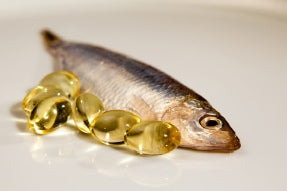Dog Health Articles - Can I Feed My Dog Too Much Fish Oil?
Can I feed my dog too much fish oil?

We are hearing this question more frequently as the possible dangers of overfeeding fish oil are propagated on the net and in social media. It is of particular concern to us because we manufacture supplements containing fish oil fatty acids.
So what’s the answer? Well, the answer is to understand why we may need to feed fish oil to our dogs in the first place and what kinds and quantities of fish oil are to be avoided.
Omega 3 fatty acids (particularly DHA and EPA) are essential in the diets of our dogs because our dogs can’t make them. Omega 6 fatty acids that come from nuts and grains are also essential.
A dog’s natural diet of raw meat, fish and some vegetable content will tend to provide both Omega 3 and Omega 6 in a reasonable balance. However as soon as we feed convenient prepared modern pet food we move away from this ideal. The vast majority of pet foods contain too much Omega 6 as a result of the high carbohydrate content caused by the addition of grains (cereal and rice). Because Omega 6 is then excessive, our dog’s nutrition is damaged and we feel the real need to compensate with additional Omega 3 supplements.
So far so good; but which Omega 3 and how much?
Some vegetable oils are Omega 3 (flax for example) but they contain no DHA or EPA fatty acids and our dogs can only convert a tiny percentage (1-2%) to the required DHA/EPA. So they are pretty useless in this context.
Marine derived oils (from fish, crustaceans and molluscs) therefore form the most common source of Omega 3 supplementation. These different sources yield very different forms of Omega 3 and this is where dangers of over feeding may arise.
Fish Oils
Oils pressed from fish, often salmon, are a common source and they are rich in DHA/EPA. They can be sold in their relatively natural state or they can be refined and processed to increase the DHA/EPA content. They are absorbed best in their natural state, refining reduces absorption.
The dangers of overfeeding (feeding more than the manufacturers recommended dose or feeding combined products from more than one manufacturer) can be caused by:
- Toxins: Heavy metals and man made contaminants such as Mercury and PCB’s are present in fish oils. Natural unrefined oils from the larger fish contain the most. Refined fish oils of good quality may contain less of them however.
- Oxidation: Fish oils oxidise on storage, and taken to the extreme this is what we call “rancid”. Some oxidation is always present and the chemical bi-products are harmful. Refined fish oils oxidise more than the natural ones.
- Vitamin E depletion: Fatty acids react with Vitamin E in the livers of our dogs. The higher the level of Omega 3 the lower the level of vitamin E in the bloodstream and organs leading to vitamin E deficiency.
Fish oils in summary:
Excellent supplements but the downsides are that exceeding recommended doses can cause complications in high contaminant and toxin intake and vitamin E deficiency. Raw oily fish, even a small amount, may be better than fish oil supplements. Not as convenient though.
Krill Oil
Krill, a crustacean, is the source of an Omega 3 oil in a much more absorbable form than fish oil. It is a phospholipid and gives as much as 50 times better assimilation than say pressed salmon oil. It is expensive but far less intake is needed. Also krill oils are practically devoid of contaminants and toxins.
Green Lipped Mussel
Many supplements contain Green Lipped Mussel and this also contains Omega3 fatty acids. Like Krill oil they are in a phospholipid form and so carry none of the contaminants and toxins of fish oil.
So what’s the verdict?
Feeding a small amount of raw oily fish a couple of times a week is the best way of ensuring your dog obtains enough Omega3 to balance the excessive Omega 6 that they are probably getting from their “modern” pet food diet.
If you don’t want the inconvenience of this then by all means use a supplement. The more expensive Krill oil and other phospholipid products (now also available from salmon) are the best because there are no dangers from contaminants and toxins. However a good quality pressed salmon oil is still good – just stick to the recommended dose.
Don’t feed whole fish and supplement as well – that is not necessary. With supplements don’t exceed recommended amounts or use more than one product at a time. The exception to this is Green Lipped Mussel supplements, they do not contribute to the risk of overfeeding Omega 3.






